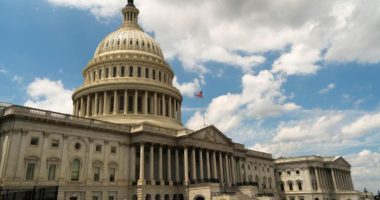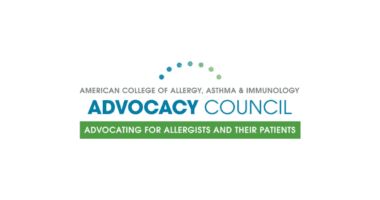As we near the end of 2024, the Advocacy Council is once again deeply engaged in the legislative fight to urge Congress to prevent devastating cuts to physician Medicare reimbursements from taking effect on Jan. 1.
The Advocacy Council had recent success building momentum for a legislative solution – and we owe much of this success to our allergist advocates.
Absent Congressional action, physicians will face payment reductions from two policies that must be addressed by Congress through legislation.
The first is a 2.83% pay reduction due to the expiration of a 2.83% increase Congress provided for 2024.
Second, Congress also must prevent a 4% pay reduction that would be caused by a provision of the American Rescue Plan Act (ARPA) of 2021 called PAYGO. Under PAYGO, Congress is required to offset the cost of legislation that adds to the federal budget deficit. Congress regularly waives PAYGO, but did not waive it for ARPA. This triggers an automatic 4% reduction for Medicare payments, which was one of the offsets. Congress has twice delayed this cut from taking effect but must take action again before the end of this year to prevent it from starting in 2025.
These two policies, combined with the ongoing 2% reduction from Medicare Budget Sequestration, would result in a 9% reduction to Medicare payments to physicians in 2025.
Thankfully, there is bipartisan support from Congress not to allow all of these cuts. However, there are many competing priorities for the short window of time in which Congress must address this (and other issues) before the end of the year.
The Advocacy Council is doing its part to emphasize the urgency of the issue and ask Congress to mitigate these cuts.
We were asked by our colleagues in the American Medical Association (AMA) to help promote a Senate version of a bipartisan letter in support of mitigating these cuts. Our goal was to help get as many Senators to sign the letter as possible. After contacting every Senate office, we are pleased to report that 41 senators cosigned the letter.
Additionally, we express our thanks to the 220 allergists who agreed to sign a letter created by the Advocacy Council that was sent to their individual representatives and senators. We are grateful to those who answered the call!
Our advocacy letter was sent to 82 Senate offices and 138 House offices. These letters received an overall positive response, largely because the legislators saw their constituents’ names signed on to the letter.
While we are pleased with the results of these two efforts, there is more work to be done. The Advocacy Council will continue to fight for legislation that prevents these cuts and advances sustainable solutions to the Medicare reimbursement policy so that we do not have to fight this same battle every year.
The Advocacy Council – ADVOCATING FOR ALLERGISTS AND THEIR PATIENTS.




